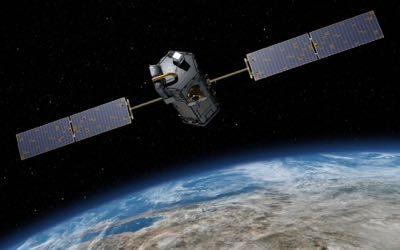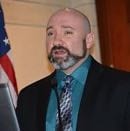CONGRESS ON HARNESSING BIG DATA FOR THE ENVIRONMENT
DECEMBER 6-7, 2016
American Geophysical Union Conference Center
2000 Florida Ave NW
Washington, DC
The volume of data generated today – and our ability to process and analyze it – is unprecedented. This new big data paradigm results in data sets that are too large and too complex to be processed by traditional applications. When supported by emerging analytical capabilities, big data represents a source for ongoing and refined discovery and analysis of social, market, and environmental trends and opportunities.
Big data represents a new frontier in data collection and analysis, and is not without challenges. These include the cleaning, storage, and visualization of raw information, as well as information privacy. When these challenges are overcome, advanced methods of analyzing big data can enable more confident decision-making, leading to more effective and efficient outcomes.

Despite growing recognition of the capabilities of big data, we are only just beginning to appreciate the implications of enhanced monitoring and visualization competences for natural resources management and environmental policy.
Big data and associated monitoring, analysis and visualization technologies can enable scientists and policymakers to translate large amounts of data into usable formats and develop the knowledge needed to address complex, multidisciplinary environmental issues. Indeed, big data analysis is increasingly being applied by government agencies, NGOs and businesses to address environmental and sustainability issues at all scales.
RNRF’s 2016 Congress on Harnessing Big Data for the Environment will explore the implications of this data deluge for decision-making in natural resources management and environmental policy, and how it can be harnessed to facilitate informed and effective responses to complex issues. It also will feature discussion of the promise, challenges, and limitations associated with big data collection, analysis and use; and identification of high-priority data gaps for the management of critical resources. The unique capabilities and priorities of the private and public sectors will be examined, as well as the implications of residual budgetary pressures from the Budget Control Act of 2011.
The second day of the congress will feature five case studies highlighting the use of big data as a decision-making tool for on-the-ground action from a global to local scale. Speakers will discuss their experiences navigating the big data landscape to restore and sustain critical natural resources.
Summaries of presentations, findings, and recommendations of participants are presented in a special edition of the Renewable Resources Journal available here.
SPEAKERS



Robert Chen
The Earth Institute, Columbia University

Brad Garner
U.S. Geological Survey

Matthew Hansen
University of Maryland

Matt Hourihan
American Association for the Advancement of Science

Kristin Tolle
Microsoft

Jeff de La Beaujardière
National Oceanic and Atmospheric Administration

Carl Gouldman
National Oceanic and Atmospheric Administration

Rachael Petersen
World Resources Institute

Matt Cooper
Conservation International

Gerald "Stinger" Guala
U.S. Geological Survey

Rizwan Khaliq
IBM Global Public Sector and Smarter Cities
PROGRAM
Tuesday, December 6: Big Data Foundations
8:00 am – 8:30 am
Registration and Continental Breakfast
8:30 am – 8:40 am
Welcome and Opening Remarks
Richard Engberg
Chairman, RNRF Board of Directors
North Bethesda, Maryland
8:40 am – 9:10 am
The data revolution and what it means for the environment
What is big data in the context of the environmental field? What promise does it hold for better environmental knowledge and decision-making? What are the current challenges and limitations of applying big data for the environment?
Lucas Joppa is an environmental scientist at Microsoft Research where he leads engagements on environmental sustainability and heads a research program on artificial intelligence, machine learning, and ubiquitous computing technologies for monitoring, modeling, and managing earth's natural environments. Topics of interest include some of the hardest challenges in environmental sustainability, including conserving biodiversity, ensuring robust food systems, and mitigating climate change. Recently, Joppa co-founded the Nature + Computing group, a diverse collection of scientists drawn from Microsoft Research who develop and apply the tools of data science to scientific data and whose research interests are focused on the study of nature.
Scientist
Microsoft Research
Seattle, Washington
9:10 am – 9:25 am
Questions and Discussion
9:25 am – 9:55 am
Frontiers in data collection, storage and sharing
How have new and emerging capabilities (satellites, crowd sourcing/ citizen science, improved sensors, etc.) facilitated better (more accurate, more timely, over larger geographic areas, etc.) data collection? How have new storage capabilities facilitated the data revolution? How do we address the challenges associated with data quality, sharing (access and availability), and security?
Ruth Duerr is a research scholar at the Ronin Institute for Independent Scholarship. Her research interests include nearly all facets of science data management, digital archives, records management, digital library science, and software and system engineering. She has authored and co-authored many publications on the management and curation of Earth science data. As a participant in several Federation of Earth Science Partners (ESIP) committees and clusters, she was the first chair of the ESIP Data Preservation and Stewardship cluster, and has more recently served as both co-chair and chair of the Data Stewardship Committee.
Outside of ESIP, she has participated and held leadership positions in groups such as the NASA Earth Observing System’s (EOS) Operations Working Group and the Research Data Alliance’s (RDA’s) e-Preservation Interest Group and Domain Repositories Interest Group. After previously serving as the elected Secretary for the Earth and Space Science Informatics (ESSI) Focus Group of the American Geophysical Union (AGU), she is currently the President-elect of that group. Duerr also teaches about data management at the University of Illinois at Urbana Champaign, contributing to the expertise of new data management practitioners.
Duerr has a B.S. in math and physics from the University of North Dakota and a M.S. in astronomy from the University of Arizona.
Research Scholar
Ronin Institute for Independent Scholarship
Denver, Colorado
9:55 am – 10:25 am
Questions and Discussion
10:25 am – 10:40 am
Break
10:40 am – 11:10 am
Frontiers in data analysis, visualization, and application
What new and emerging capabilities do we have for analyzing and communicating data? How can data in different formats be better integrated? How can we answer environmental questions and inform decision-making better or in different ways than before? What are the opportunities and challenges facing this application of big data for decision-making?
Robert S. Chen is director of CIESIN, the Center for International Earth Science Information Network, a research unit of the Earth Institute at Columbia University. He manages the NASA Socioeconomic Data and Applications Center (SEDAC), part of NASA's network of earth science data centers. He also co-manages the Intergovernmental Panel on Climate Change (IPCC) Data Distribution Center, which provides access to data and information from IPCC assessments and reports. Chen is currently a co-chair of the Data Sharing Working Group of the Group on Earth Observations (GEO) and of the Thematic Network on Sustainable Development Data of the United Nations Sustainable Development Solutions Network (UNSDSN). He also serves on the Governing Council of the Interuniversity Consortium for Political and Social Research (ICPSR) at the University of Michigan, the Science Advisory Board of the Climate Change Science Institute at Oak Ridge National Laboratory, and the Council of the American Geographical Society (AGS). At Columbia, Chen is an ex officio member of the Earth Institute Faculty and a member of its Practice Committee, and is serving on the faculty advisory committee for the Columbia Global Center | East Asia. Chen received his Ph.D. in geography from the University of North Carolina at Chapel Hill and M.S. and B.S. degrees from the Massachusetts Institute of Technology.
Director, Center for International Earth Science Information Network
The Earth Institute, Columbia University
Palisades, New York
11:10 am – 11:40 am
Questions and Discussion
11:40 am – 12:40 pm
Data needs for natural resources management and environmental policy
What are the highest priority data gaps that need to be filled to increase understanding of and improve environmental indicators? What data are needed to develop, monitor and evaluate policies in the United States?
11:40 am – 12:00 pm
Water
Brad Garner is the manager for the USGS water data presence on the web and is a part of the team that is overseeing the once-in-a-generation replacement of the core computing system that stores and delivers all streamflow, groundwater, and water quality data collected by the USGS over the past 125 years. Garner has worked for the USGS since 2003 working on a wide range of hydrologic science topics. He has a B.S. in Computer Sciences and an M.S. in Geological Sciences, both from the University of Texas at Austin.
Hydrologist
U.S. Geological Survey
Reston, Virginia
12:00 pm – 12:10 pm
Questions and Discussion
12:10 pm – 12:30 pm
Land Cover
Matthew Hansen is a remote sensing scientist with a research specialization in large area land cover and land use change mapping. His research is focused on developing improved algorithms, data inputs and thematic outputs which enable the mapping of land cover change at regional, continental and global scales. Such maps enable better informed approaches to natural resource management, including deforestation and biodiversity monitoring and can also be used by other scientists as inputs to carbon, climate and hydrological modeling studies. Hansen's work as an Associate Team Member of NASA's MODIS Land Science Team included the algorithmic development and product delivery of the MODIS Vegetation Continuous Field land cover layers. His current research includes taking the global processing model for MODIS and applying it to the Landsat archive. Exhausting mining of the Landsat archive has been used to map forest disturbance in the Congo Basin, Indonesia, European Russia, Mexico, Quebec and the U.S. The methods developed in these efforts will be used to test global-scale disturbance mapping with Landsat data.
Hansen has a B.S. in electrical engineering from Auburn University, an M.A. in geography and an M.S. in engineering from the University of North Carolina, Charlotte, and a Ph.D. in geography from the University of Maryland, College Park.
Professor, Geographical Sciences
University of Maryland
College Park, Maryland
12:30 pm – 12:40 pm
Questions and Discussion
12:40 pm – 1:30 pm
Lunch
1:30 pm – 1:45 pm
Continuing sequestration under the Budget Control Act of 2011: Impacts on science and technology funding
Sustaining support for science and technology under budget caps.
Matt Hourihan is the director of the R&D Budget and Policy Program for the American Association for the Advancement of Science (AAAS), where he is a regular source of information and analyses on past, present, and future science budgets for policymakers and the science community. He has served in this position since 2011.
Prior to joining AAAS, he served as a clean energy policy analyst at the Information Technology & Innovation Foundation (ITIF). While at ITIF, he tracked federal energy R&D investments and innovation activities, and authored several white papers and policy briefs exploring the role of innovation in solving the nation's energy and climate challenges. He also regularly coordinated Congressional briefings, conferences, and events bringing together leading experts in government, industry, and academia. Previously, he served as Jan Schori Fellow at the Business Council for Sustainable Energy, a coalition of energy firms and utilities working to engage policymakers for market-based solutions to sustainable energy development and climate change.
As a student, Hourihan interned with the AAAS Center for Science, Technology and Congress, now the Office of Government Relations. He earned a masters degree in public policy with a focus on science and technology policy at George Mason University, and a B.A. in journalism from Ithaca College. Prior to graduate school, he worked for five years as a cause communications professional and an award-winning journalist.
Director, Research & Development Policy Program
American Association for the Advancement of Science (AAAS)
Washington, District of Columbia
1:45 pm – 2:00 pm
Questions and Discussion
2:00 pm - 2:30 pm
Private sector capabilities
How does the private sector harness big data for the environment? What unique capabilities does this sector have for implementing big data analysis to answer questions and solve problems?
Kristin Tolle is director of Program Management in the Advanced Analytics team at Microsoft. She has more than 20 years of experience in industry and research computing. Since joining Microsoft in 2000, Tolle has generated numerous patents and worked for several product teams including the Natural Language Group, Visual Studio, and the Microsoft Office (MS Excel). During her ten years in Microsoft Research, she launched and managed several major programs including Environmental Infrastructure Development, where she managed a team of program managers, developers and testers to build the infrastructure and data management underpinning a suite of cloud-based environmental science tools.
Tolle received a B.S. in computer information systems from Boise State University, and an M.S. in management information systems and Ph.D. in management of information science - computational linguistics, medical informatics, both from the University of Arizona.
Director of Program Management
Advanced Analytics Team
Microsoft
Seattle, Washington
2:30 pm – 3:10 pm
Questions and Discussion
3:10 pm – 3:40 pm
Public sector role and capabilities
What is the role of the federal government in harnessing big data for the environment? What unique capabilities does this sector have for implementing big data analysis to answer questions and solve problems?
Jeff de La Beaujardière has been the NOAA Data Management Architect since May 2011 and Chair of the Environmental Data Management Committee since 2012. He also serves on inter-agency and international groups aimed at enhancing data sharing and interoperability, including the international Group on Earth Observations Data Management Principles Task Force, the US Group on Earth Observations Data Management Working Group, and the Open Geospatial Consortium. In these roles he works toward the vision that NOAA's rich and unique data holdings shall be discoverable, accessible, well-documented, compatible, and preserved for future use.
Previously, de La Beaujardière was Senior Systems Architect for the US Integrated Ocean Observing System Program Office at NOAA, where he guided the implementation of interoperability standards by IOOS partners for data access and discovery. Prior to joining NOAA, he spent 13 years at NASA Goddard Space Flight Center in such roles as Geospatial One-Stop Portal Manager; web services developer for the Modeling, Analysis and Prediction 2005 project, the GLOBE Program, and the Public Use of Remote Sensing Data Program; and NASA’s representative to OGC and to the Unidata Policy Committee. He participated in the first OGC Web Mapping Testbed in 1998, implemented the first Web Map Server at NASA, and was Editor of the WMS specification for OGC and the International Organization for Standardization.
De La Beaujardière holds a BA in Physics (1985) from the University of California at Berkeley and a PhD in Astrophysics (1990) from the University of Colorado at Boulder.
Data Management Architect and Environmental Data Management Committee Chair
National Oceanic and Atmospheric Administration
Silver Spring, Maryland
3:40 pm – 4:10 pm
Questions and Discussion
Wednesday, December 7: Applications of Big Data for Sustainability and Natural Resources Conservation
Case studies highlighting the use of data and innovative technologies to answer questions and facilitate informed responses to environmental issues.
— What unique challenges were faced in collecting, storing and accessing relevant, high quality data? What approaches were key to success?
— Is data readily available for this need? What information would be valuable to have?
— What data science/ analytical techniques were applied?
— How have partnerships facilitated data access and improved technological and analytical capabilities?
— How is this application being used as a decision-making tool for on-the-ground action?
8:00 am – 8:30 am
Continental Breakfast
8:30 am – 8:40 am
Introduction
8:40 am – 9:10 am
U.S. Integrated Ocean Observing System (IOOS)
Carl Gouldman is Deputy Director of the U.S. Integrated Ocean Observing System (IOOS) Program. Since 2000, he has served in various capacities at NOAA and IOOS, including program coordinator, program analyst, division chief, and acting deputy director. Prior to his government service he was Education Senior Manager at the Chesapeake Bay Foundation.
Gouldman holds a B.S. in political science and an M.E.M. in coastal environmental management from Duke University.
Deputy Director
U.S. Integrated Ocean Observing System
National Oceanic and Atmospheric Administration
Silver Spring, Maryland
9:10 am – 9:40 am
Questions and Discussion
9:40 am – 10:10 am
Global Forest Watch
Rachael Petersen is the Impacts Manager of Global Forest Watch (GFW), a powerful near-real-time forest monitoring system that unites technology and human networks to create never-before-possible transparency on what is happening in forests around the world. Petersen coordinates GFW’s 90+ partners, including Google, Digital Globe, Planet, University of Maryland, Orbital Insight and others, to improve the state-of-the-art of real-time forest monitoring, and builds tools to deliver data to stakeholders on the front lines of forest management.
Prior to joining the World Resources Institute, Petersen was a Thomas J. Watson Foundation Fellow, during which she traveled the world researching how remote indigenous communities harness digital technology to preserve their cultures. Her research on how data and technology inform decision making has taken her to the high Canadian Arctic, the Amazon rainforest, Borneo, the Australian outback, Mexico and Uganda. Previously, she worked as a researcher for the James A. Baker III Institute for Public Policy and as a Data Science Teaching Assistant at General Assembly.
Petersen holds a B.A. in Environmental Policy and Anthropology from Rice University in Houston, Texas. She speaks Spanish, Portuguese, and German, and is conversational in Inuktitut and Penan.
Impacts Manager, Global Forest Watch
World Resources Institute
Washington, District of Columbia
10:10 am – 10:40 am
Questions and Discussion
10:40 am – 11:00 am
Break
11:00 am – 11:30 am
Vital Signs
Matt Cooper is the Data Manager for Vital Signs. He brings a unique combination of experience at the intersection of environmental conservation, international development, and data science. He has worked at every step of the environmental data flow, from identifying plants and collecting soils samples in the field to creating predictive statistical models from large datasets using emerging analytics technologies. Before joining CI, Cooper worked with the Peace Corps, the Forest Service, and in environmental consulting. He has conducted botanical fieldwork in Appalachia, southeast Alaska, urban Miami, the Philippines and in Sudanian savannas in Uganda and Mali. He has worked using many languages (natural and artificial), including Spanish, French, Bambara, and Tagalog, as well as Python, R, SQL and Ruby. Cooper has degrees in Geography from the University of Florida and the University of North Carolina at Chapel Hill.
Data Manager, Vital Signs
Betty and Gordon Moore Center for Science and Oceans
Conservation International
Arlington, Virginia
11:30 am – 12:00 pm
Questions and Discussion
12:00 pm – 12:45 pm
Lunch
12:45 pm – 1:15 pm
Biodiversity Information Serving Our Nation (BISON)
Gerald "Stinger" Guala is the Branch Chief for Eco-Science Synthesis in the Core Science Analytics and Synthesis Program of the Core Science Systems Mission Area of the United States Geological Survey. His duties include directing the Integrated Taxonomic Information System (ITIS), which is the Federal standard for the names of biological organisms, and Biodiversity Information Serving Our Nation (BISON), the Federal clearinghouse for species occurrence data with more than 260 million records currently. He also facilitates other activities at the national level to deliver, integrate, analyze and visualize Federal and non-Federal biodiversity information. For example, he is Co-Chair of the Whitehouse OSTP Committee on Environment and Natural Resources and Sustainability (CENRS) Subcommittee on Ecological Systems (SES) Working Group on Biodiversity and Ecosystem Informatics (BioEco), which is leading the effort to implement EcoINFORMA, the Federal strategy for integration and delivery of environmental data laid out by the President’s Council of Advisors on Science and Technology. Guala holds a B.S. in botany from Michigan State University and an M.S. and Ph.D. in botany from the University of Florida.
Branch Chief, Eco-Science Synthesis
Director of Biodiversity Information Serving Our Nation (BISON)
Director of the Integrated Taxonomic Information System (ITIS)
Core Science Analytics, Synthesis and Libraries
Core Science Systems
U.S. Geological Survey
Reston, Virginia
1:15 pm – 1:45 pm
Questions and Discussion
1:45 pm – 2:00 pm
Break
2:00 pm – 2:15 pm
IBM Smarter Cities: Infrastructure (Water, Transportation, Energy)
Rizwan Khaliq is director of Marketing and Communications for IBM Global Public Sector and Smarter Cities. He is responsible for all marketing, go to market and communications for public sector industries which include government, healthcare, life sciences and education. Prior to his current responsibilities, Khaliq was director of Marketing and Communications for IBM Global Communications Sector, business leader for IBM Intelligent Transportation Systems, and business unit executive for IBM's Digital Communities Business. He also served at the U.S. Department of State as commercial attaché at the embassies of Denmark and South Africa, and additional temporary assignments. For his service, Khaliq was awarded the "Gold Metal Award" for distinguished achievements in foreign services from the U.S Secretary of Commerce, The Secretary's Award from the U.S Secretary of State, and the "Thomas Jefferson Star for Foreign Service" from President George W. Bush.
Khaliq holds an M.A. in International Transactions and a B.A. from George Mason University.
Director, Marketing and Communications
IBM Global Public Sector and Smarter Cities
Washington, District of Columbia
2:15 pm – 2:30 pm
Questions and Discussion
2:30 pm – 3:15 pm
Congress Wrap-Up and Discussion
Robert Day
RNRF Executive Director
North Bethesda, Maryland
REGISTERED DELEGATE AFFILIATIONS
American Association for the Advancement of Science
American Fisheries Society
American Geophysical Union
American Meteorological Society
American Society of Civil Engineers
American Society of Landscape Architects
American Water Resources Association
ArchPlan, Inc.
Auburn University, GIS and Remote Sensing Laboratory
Coalition on Agricultural Greenhouse Gases
Columbia University, The Earth Institute
Conservation International
Duke University, Nicholas School of the Environment
Environmental Defense Fund, Coastal Protection
Environmental Defense Fund, Office of Chief Scientist
Executive Office of the President, Office of Science and Technology Policy
Fudan University
Geological Society of America
IBM Global Public Sector and Smarter Cities
Microsoft
Microsoft Research
Monterey Bay Aquarium Research Institute
National Academies of Sciences, Engineering, and Medicine
National Oceanic and Atmospheric Administration
Office of U.S. Senator Bill Cassidy
Pennsylvania State University, College of Information Sciences and Technology
Ramboll Environmental
Renewable Natural Resources Foundation
Ronin Institute for Independent Scholarship
Society of Wood Science and Technology
Texas A&M University Corpus Christi, Harte Research Institute for Gulf of Mexico Studies
The Wilderness Society, Energy and Climate Program
Timmons Group
U.S. Environmental Protection Agency
U.S. Geological Survey
U.S. Global Change Research Program
U.S. House Committee on Natural Resources
University of Georgia, Georgia Sea Grant
University of Maryland, Department of Geographical Sciences
University of Maryland, Department of Mechanical Engineering
University of Maryland, Division of Research
University of Vermont, Gund Institute for Ecological Economics
University of Wisconsin, Madison
University of Wisconsin, Madison, Nelson Institute for Environmental Studies
USDA Forest Service, Research
Washington State University, School of the Environment
World Resources Institute
FURTHER READING
A World that Counts: Mobilising The Data Revolution for Sustainable Development. UN Secretary General's Independent Advisory Group on a Data Revolution for Sustainable Development. 2014.
Big Data and Environmental Protection: An Initial Survey of Public and Private Initiatives. Environmental Law Institute. 2014.
Big Data in U.S. Agriculture. Congressional Research Service. 2016.
Biodiversity Information Serving Our Nation (BISON)
Computational Sustainability Network
Data Intelligence for 21st Century Water Management: A Report from the 2015 Aspen-Nicholas Water Forum. Duke University Nicholas Institute for Environmental Policy Solutions and The Aspen Institute Energy & Environment Program.
Ecoinformatics-based Open Resources and Machine Accessibility (EcoINFORMA)
The Federal Big Data Research and Development Strategic Plan. The Networking and Information Technology Research and Development Program. 2016.
Global Earth Observation System of Systems (GEOSS)
Sustainability in the Age of Big Data. University of Pennsylvania Wharton School of Business. 2014.
CONGRESS PROGRAM COMMITTEE
Chair:
Richard Engberg, RNRF Chairman; American Water Resources Association
Members:
Tom Chase, Alternate Director, RNRF Board of Directors; Director, Coasts, Oceans, Ports & Rivers Institute, American Society of Civil Engineers
Robert Day, RNRF Executive Director
John E. Durrant, RNRF Vice-Chairman; Sr. Managing Director, Engineering & Lifelong Learning, American Society of Civil Engineers
Sarah Gerould, RNRF Board Member; Society of Environmental Toxicology and Chemistry
Erik Hankin, RNRF Board Member; Program Manager, Student Programs, American Geophysical Union
Paul Higgins, RNRF Board Member; Director, Policy Program, American Meteorological Society
Howard Rosen, RNRF Board Member; Society of Wood Science and Technology
Ya'el Seid-Green, Alternate Director, RNRF Board of Directors; Policy Program Associate, American Meteorological Society
Nancy C. Somerville, Alternate Director, RNRF Board of Directors; Executive Vice President, American Society of Landscape Architects
Barry Starke, RNRF Board Member; American Society of Landscape Architects; Principal, Earth Design Associates, Inc.
Kasey White, RNRF Board Member; Director of Geoscience Policy, Geological Society of America
RNRF Staff Liaisons:
Nicolas Kozak, Program Director
Melissa M. Goodwin, former Program Director
Jennee Kuang, former Program Associate
Special Thanks To:
Robert Chen, Director, Center for International Earth Science Information Network, Columbia University
Stefano Ermon, Assistant Professor of Computer Science; Fellow, Woods Institute for the Environment, Stanford University
Gerald "Stinger" Guala, Branch Chief, Eco-Science Synthesis, U.S. Geological Survey
Angel Hsu, Assistant Professor Adjunct, Yale-NUS College, Singapore
David Thau, Senior Development Advocate, Google Earth Engine
Individuals attending Renewable Natural Resources Foundation events may be videotaped, audiotaped or photographed during the course of a meeting. By attending the RNRF Congress on Harnessing Big Data for the Environment, delegates grant RNRF the right to use your name, photograph, biography, and the content of any comments, if any, in RNRF educational, news, or promotional material, whether in print, electronic or other media, including the RNRF website.
